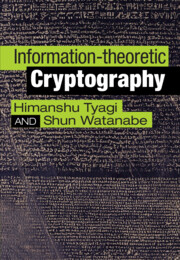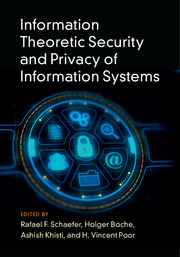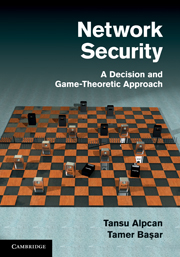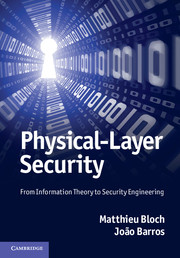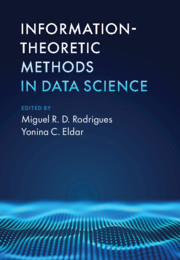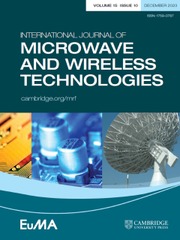Information-theoretic Cryptography
This book offers a mathematical foundation for modern cryptography. It is primarily intended as an introduction for graduate students. Readers should have basic knowledge of probability theory, but familiarity with computational complexity is not required. Starting from Shannon's classic result on secret key cryptography, fundamental topics of cryptography, such as secret key agreement, authentication, secret sharing, and secure computation, are covered. Particular attention is drawn to how correlated randomness can be used to construct cryptographic primitives. To evaluate the efficiency of such constructions, information-theoretic tools, such as smooth min/max entropies and information spectrum, are developed. The broad coverage means the book will also be useful to experts as well as students in cryptography as a reference for information-theoretic concepts and tools.
- Covers most basic topics in cryptography without requiring knowledge of computation complexity theory, thus making the book accessible to readers who lack specialized training
- Includes information-theoretic tools useful in the context of cryptography, which researchers can use as a reference
- Problem formulations and results are stated in the language of non-asymptotic analysis, allowing contents of the book to be seamlessly used for applications
Reviews & endorsements
'This is a unique and extraordinary book covering everything on information-theoretic cryptography. It's a must-read book for all researchers and students interested in unconditional security.' Hirosuke Yamamoto, The University of Tokyo
'A masterful blend of information theory and cryptography, this treatise is a treat for the researcher -- teacher and student, alike.' Prakash Narayan, University of Maryland
'Tyagi and Watanabe provide readers with a new solid reference for unified understanding of key subjects in the cryptography as developed in seven decades since Shannon. In fact, this book provides a comprehensive and thorough presentation of information theoretically secure cryptographic primitives, also shedding due light on the relevance to computationally secure ones. It looks like those primitives have now been washed-up and reborn in the new cradle of information theory. I recommend this text as a reliable compass for both beginners and professionals working in cryptography.' Te Sun Han, National Institute of Information and Communications Technology, Japan
Product details
April 2023Hardback
9781108484336
517 pages
250 × 175 × 30 mm
1kg
Not yet published - available from
Table of Contents
- 1. Introduction
- Part I. External Adversary: Encryption, Authentication, Secret Key:
- 2. Basic information theory
- 3. Secret keys and encryption
- 4. Universal hash families
- 5. Hypothesis testing
- 6. Information reconciliation
- 7. Random number generation
- 8. Authentication
- 9. Computationally secure encryption and authentication
- 10. Secret key agreement
- Part II. Internal Adversary: Secure Computation:
- 11. Secret sharing
- 12. Two-party secure computation for passive adversary
- 13. Oblivious transfer from correlated randomness
- 14. Bit commitment from correlated randomness
- 15. Active adversary and composable security
- 16. Zero-knowledge proof
- 17. Two-party secure computation for active adversary
- 18. Broadcast, Byzantine agreement, and digital signature
- 19. Multiparty secure computation
- Appendix. Solutions to selected problems
- References
- Notation index
- Subject index.

